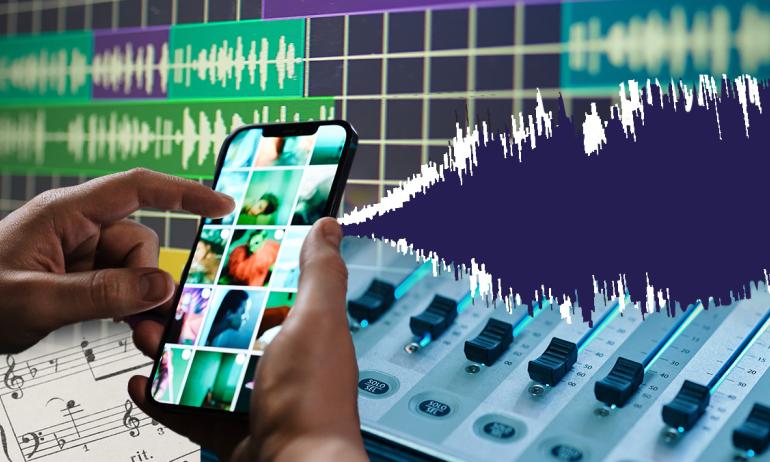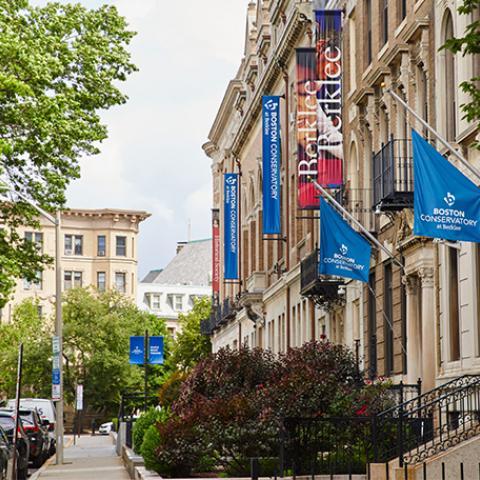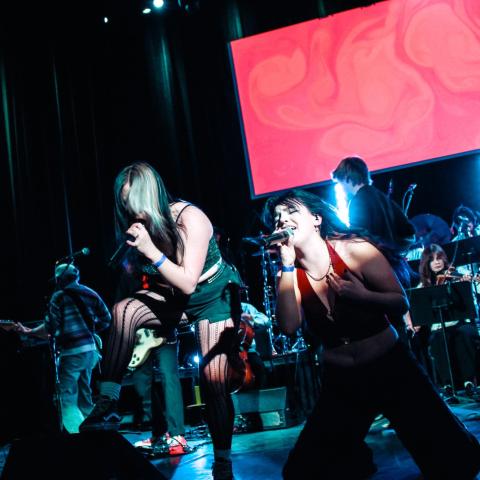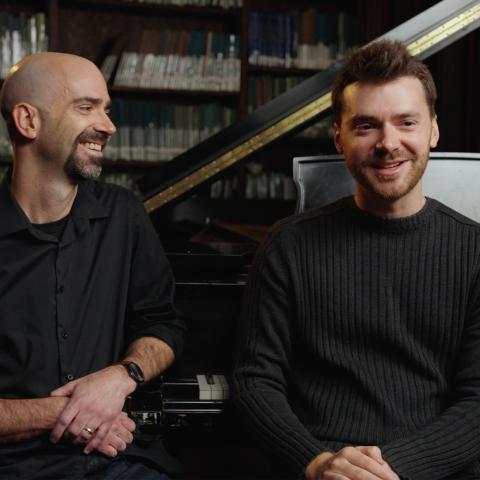Themes of 'Thrones'
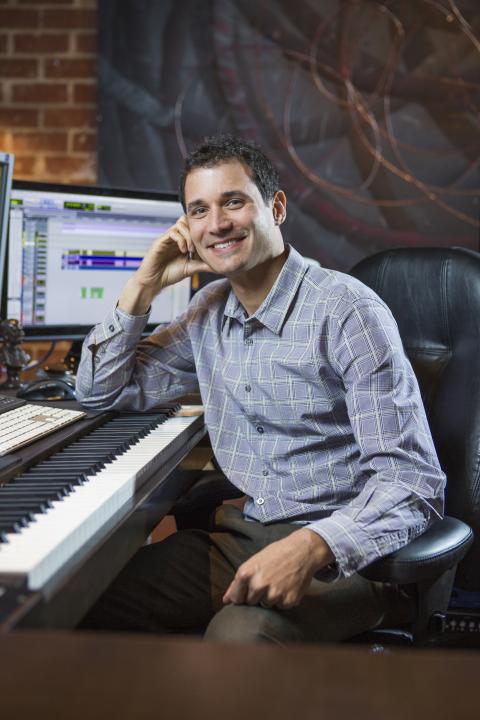
Ramin Djawadi '98
Joey Cobbs
You know your music is connecting when people all across the globe are performing it. A YouTube search for Ramin Djawadi’s theme for the hit HBO series Game of Thrones brings up an astonishing array of cover versions—some with more than 5 million views. Not unexpected are the piano, cello, violin, metal, dubstep, or even flamenco versions. Less predictable are a spaghetti-Western version (with twangy electric guitar and whistler), and renditions by Indian or Turkish ensembles, British and Brazilian palace guard brass bands, a cappella vocal groups, bagpipers, bluegrass outfits, Celtic harp ensembles, and Russian accordionists. The Emmy and Grammy-nominated Djawadi has clearly struck a nerve.
Ramin Djawadi (pronounced rah-MEEN jah-VAH-dee) grew up in in a small town in western Germany, not far from Düsseldorf, with his German mother, Iranian father, and two brothers. Being raised in Europe, he was exposed early on to classical as well as to popular music, but he also absorbed the haunting sounds of voice and violin in the traditional Iranian music that his father listened to. These influences have added dimension to Djawadi’s sonic palette and style.
Evidence that his early musical experience involved keyboards and stringed instruments is visible with a glance around his studio at Remote Control Productions in Santa Monica, CA. Stashed in every corner are standard and ethnic instruments—Russian balalaika, Middle-Eastern oud, Greek bouzouki, hammered dulcimer, as well as American resonator, electric, and acoustic guitars. Musical and computer keyboards, audio and video monitors, and other gear fill the rest of his workspace.
Here, he blends MIDI instruments (often replaced or supplemented by orchestral instrumentation and choir tracks) with his own playing of the sundry instruments that imbue some of his music with an exotic character. These are the weapons in Djawadi’s musical arsenal for creating music for TV series like Game of Thrones and Person of Interest (among others), and the scores to about a dozen films including Iron Man, Pacific Rim, Clash of the Titans, and Mr. Brooks (starring Kevin Costner and William Hurt). While best known for the indelible melodic themes and atmospheric music supporting the intrigue and internecine warfare of the Game of Thrones fantasy world, Djawadi is also at home writing for films in the animated, horror, suspense, and science fiction genres.
Since arriving in the area 16 years ago, he has distinguished himself among the throng of young composers in Los Angeles. He possesses a raging passion for music and a work ethic that drives him to produce high-quality music nonstop for TV, movie, and video game projects every day of the week. The amiable composer paused just long enough for a few pictures and an interview for this story. And then it was back to work. That day, he was completing various projects while awaiting the cue to begin working on the anxiously anticipated Season 6 of Game of Thrones. No doubt it will come with a punishing deadline. But as always, Djawadi will deliver the right music for the action on the screen on time.
What was your introduction to music?
I started out playing a Hohner [electronic] organ when I was four years old. I was so little that I had to stand to reach the pedals. You could change the sounds of the manuals and it had a rhythm machine. I was playing classical and pop music, but I stopped when I was 11 and didn’t do any music for two years. I was more interested in sports—swimming. When I was 13, the song “The Final Countdown” by the group Europe was a big hit, and a friend of mine told me that he was going to start playing the guitar. I decided I would too. My mom had an acoustic guitar and I grabbed it. After a couple of years I got really serious about it.
What prompted you to come to Berklee?
I liked instrumental music and film music, but I also liked playing in bands. When I was 16, in my naive thinking, I thought I would get in a band that was signed and tour the world. Then one day when I didn’t want to be onstage anymore I would go into film music. So I was planning to study music. Also, I’d always been fascinated with the U.S. as a country. We had relatives living in Washington D.C.; L.A.; and San Francisco, and my dad would send me to stay with them during summer breaks to learn English. I became obsessed with living someday in the U.S. So when it came time for college, it had to be a college here, and given that I wanted to study film music, Berklee was the school that popped up the most. Berklee had many different curricular offerings and a contemporary approach that really appealed to me.
Since German universities are tuition free, did you have to convince your parents that it was worthwhile for you to attend Berklee for college?
Not really. I had always told my parents that I wanted to go to the U.S. My dad had done the same thing. He left Iran to study medicine in Germany. I was supposed to become a doctor like my father, but I convinced them to let me study music and that Berklee was the best choice. I didn’t even consider studying music in Germany because I didn’t think the colleges were as progressive as Berklee with the emphasis on technology and all of the different majors. At the time, there wasn’t that much variety at the colleges in Germany. They were more traditionally based and I felt like I already had a lot of that from studying classical music in my childhood. I wanted to explore avenues like jazz. In reading interviews with famous musicians, I learned that a lot of them had gone to Berklee.
Were there people you met at Berklee who were influential for you?
I had [guitar lessons with] Mick Goodrick in my last year. I was very fortunate to get to study with him. Overall, I enjoyed Dennis Leclaire’s courses in the composition department and Eric Reasoner’s music editing classes. I liked everything I studied. Berklee prepares you for working in the business. I truly believe that my time at Berklee was some of the best time of my life. I met people from all over the world.
Describe your path to Los Angeles after Berklee.
Interestingly, even though I studied jazz guitar heavily, I ended up playing in a pop-rock band called My Favorite Relative with all Berklee guys in Boston. We were nominated for seven Boston Music Awards and won two of them. I also started working at a local video game company composing and doing sound design for a year. I knew eventually that I would end up in L.A., but I didn’t pursue it right away because I was having fun with the band. During that year in Boston after graduation, I went to Germany for the winter holidays. I visited the owner of a guitar store in Cologne where I used to buy things and hang out. I told him I wanted to go to L.A. He said he knew someone who knew Hans Zimmer. Through that connection I ended up going to L.A. in January 2000 and getting a chance to join [Zimmer’s] team. Hans truly embraces the idea of mentorship.
Did you work with Hans Zimmer?
I never assisted him directly. I worked with another German composer named Klaus Badelt. At the time, he was working on movies with Hans. I didn’t do any music at first. When I walked into this place and saw all the gear, it was a complete overload. I’d never seen so much equipment in my life. If they had asked me to write an action cue and have it ready the next day, I would have failed. I didn’t know how to work the gear. But I started out fixing things. A computer would crash and I’d need to reload the samples and do other things. So I learned how everything operated. The quality of the demos they were doing was so exceptional that I had a lot to learn. This was before Gigastudio and Kontakt were out, and the composers had loads of samplers going into O2R mixing boards. I had a lot to learn about the equipment and sequencing. Slowly I began doing arrangements and programming music.
What was the first project for which you wrote cues that ended up in a movie?
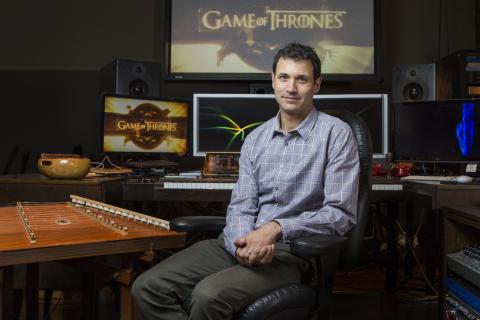
Ramin Djawadi '98
Joey Cobbs
I did a couple of movies with Klaus like The Time Machine, K19, and The Recruit. But the turning point was the first Pirates of the Caribbean movie. There was music in there that I worked on.
What project put you on the map?
I had done some things for a popular TV show called Prison Break. That put me out there. Later, I did the whole score for Iron Man [2008] and that made people more aware of me. The movie’s director, Jon Favreau, wanted the score to be different from the other superhero movie scores of the time. He really liked AC/DC and thought [Robert Downey Jr.’s] character Tony Stark was very rock and roll. He wanted a guitar-based score, so we ended up fusing orchestra with rock guitar.
Your current studio space at Remote Control keeps you in the neighborhood with Zimmer.
Yes. Hans has created a composer community here. A lot of the composers who got a start through him have stayed and rent space here. It’s a composer community that is nice to be part of. Composing can be a very lonely job. You sit all day in a room with no windows writing piece after piece and keeping these crazy deadlines. When you take a break, in the hall you’ll run into someone working on a horror film and others working on an animation or a comedy. There is a lot of music of different styles flying around. Then there is technical support. Once I had a piece of gear go down at 11:00 at night, and someone here had a spare mixing board. So I could keep working that night.
When did you start being represented by Gorfaine Schwartz?
Prison Break was in 2005, so it was after that when I started really doing some stuff. Sam Schwartz called me around that time and we’ve been working together ever since. [This was a good way for this to happen] because it’s not in my personality to be pushy.
It used to be that TV composers in Hollywood didn’t do movies and vice versa. That’s not the case any more and you’ve been able to move between both worlds.
I remember hearing about that, but when I came into the business, I decided to ignore that notion. First of all, I was happy just to get a gig, but I also didn’t think like that. Coming up through the Hans Zimmer school, I knew how to approach a project, including video games. I treat them all the same. They need a theme or a sound, and it doesn’t matter to me if it’s a movie or TV, I approach them the same way. If I like the project, I want to do it.
Your work typically blends electronic cues with orchestral cues.
Yes, nowadays, you are expected to deliver a finished, functioning demo that represents what the final will sound like. There is nothing left to the imagination for the director. They tweak that with you and then when they come to the recording stage, they feel that the live players really bring the score to life. There is obviously a step up from the demo, but you don’t want any surprises at that point with the director not recognizing a cue and wondering if it’s what he approved.
Can you describe your method of working?
When I start, the picture is not locked, there are still changes going on and the special effects are not ready. So I just start coming up with ideas, writing pieces of music that are broadly inspired by the visuals and by what the producers or directors have said they are envisioning. Your job is to [translate] that into music. It’s actually really fun because everybody has a different idea. Some like guitar some like trumpet, so you already have certain restrictions to work within. In a way, that’s easier than having someone tell you that you can do whatever you want.
Do you improvise to come up with your themes?
I do some improvising, but I also will just watch the movie and try not to write anything. I may walk around or do other stuff having the movie in my head. Then I may wake up in the middle of the night and start scribbling something down or singing into my phone. Other times I will wake up in the morning and run to my keyboard. I let the picture settle into my brain.
You’ve reworked the main title theme for Game of Thrones many times for cues that run throughout the whole series.
What is interesting in Game of Thrones is that there are so many characters and families that have their different themes. The main title covers the entire show. We return to that theme as a device to [foreshadow] something big that is going to happen. Usually that’s toward the end of the season around episode nine or 10.
Do you go to the recording sessions in Prague during the season to record with the orchestra?
Actually, I don’t even go to Prague for the sessions, we do them out of this studio through Source-Connect in Pro Tools. For me to do a six-hour session over there would take three days with travel. There’s no need for that. With the time difference, the sessions are late at night [California time]. But I am used to being awake at all hours. The schedule is stretched out enough that we can combine cues from different episodes. They shoot everything like a movie, so all 10 episodes—even if they are not completely ready—are available to me so I can see what the arc of the show is. So sometimes we might record a cue from episode five and then a cue from episode two in the same session.
How much time do you get from the spotting sessions for a picture to when the director wants to hear your electronic score?
It can be up to three weeks. Game of Thrones varies quite a bit from other TV shows where you might only have a week to turn the music around. I end up working long hours because I will have other things going on at the same time.
Your use of ethnic instruments in the Game of Thrones cues is notable because you avoid giving the music the character of any particular culture.
For this show, it’s a fantasy world and you don’t want to be put in any specific location, so the musical possibilities are endless. I’ve had fun exploring and mixing various instruments and using them in ways that are not typical.
Is there an average number of cues you do for each episode?
I don’t know about the number of cues, but the number of minutes of music in a 60-minute show varies. In the earlier episodes we’ve had as little as 12 to 15 minutes of music. Towards the end of the season it picks up and there may be as much as 50 minutes of music. I think the show is very well spotted and sometimes there are long stretches without music and that works really well. As the composer, I am sometimes the first to say, “You know what? I don’t think we need to have any music here.”
For season five, it seems that you really used the low strings quite a bit. The cello was a prominent voice.
The show is pretty dark, a lot of characters get killed off. Sometimes we laugh when in 10 episodes there’s a lighter moment. But it’s just a very dark show, so it felt natural for me to use the lower register in the music.
When you work with orchestrators, do you give them only MIDI files to work from or do you give them some notation files too?
It’s all MIDI files, I don’t have the time to make notation files anymore. But my demo says everything that’s in there. I might not put in that there is an oboe doubling a clarinet, but the clarinet line will have it in there and it will be obvious that the oboe should play the same thing. There is no guessing about what should be in there, it’s completely orchestrated when I give it to them.
What kind of music are you doing for the TV series Person of Interest?
This is the fifth season and the tone is pretty much set. [The show] has an investigative flair and the sounds are very contemporary, it’s very different from Game of Thrones. I just did an animated movie called Robinson Crusoe. It was a completely different genre with a full orchestra, and it’s a lot lighter.
Does your work on Person of Interest happen at a different time of year from Game of Thrones?
Sometimes things get stacked up, but it has always worked out. I work everyday, so I always say that everyday is a Monday. Though I work each day, I might not come in until noon on a Sunday after spending the morning with my family. They are very important to me. So if I come in at noon, I might work until 3:00 in the morning. The good thing is that I don’t need a lot of sleep.
Do you try to take every opportunity that comes your way?
I’ll take a gig if I think I can do it. I’ve had to pass on some projects when I am too booked. There are only so many hours in a day. I am very happy that people are calling me, but sometimes [an additional project] is just not doable.
Do film projects generally require more concentrated time?
It depends. When I did Pacific Rim, I spent a year on it. I started very early. [Director] Guillermo [del Toro] had finished shooting and before the movie was fully assembled, he was sending me scenes. I started writing and had done a lot pretty early on. A video game can stretch out for a year or a year and a half. That’s a perfect example of how you can juggle multiple projects because it’s on for a month and then [stops because] the next level of the game is not ready.
When you start writing, do you ever find yourself staring at a blank screen wondering what should go with a particular scene?
Sometimes you are staring at a blank screen, but I just won’t get up until I have something. I revise all the time. What I love to do is write something, then leave it and come back the next day to listen. Sometimes there is something good and other times I ask myself. “What was I thinking yesterday?” That may lead to something else. If I still like what I’ve done the next day, that’s a pretty good indication that I’m on to something. Otherwise, it’s probably better to start over.
What do you think when you see how many people on YouTube are playing the Game of Thrones theme on everything from solo guitar to water-filled glasses?
It’s amazing. I remember when the first episode of Game of Thrones came out and the producer sent me a link to a rock version of the theme. I was blown away. I love how creative people around the world have been with their different arrangements of the theme. It’s absolutely flattering.
Have you done live concerts of your music?
I’ve done a couple. The Game of Thrones premiere for season three was in New York at Avery Fisher Hall. Someone had the idea to get the New York Philharmonic to play a suite of the music beforehand. It was fantastic. In May [2015], there was a festival at a big stadium in Krakow, Poland where we performed some of the music. It was packed. In Europe, so many people are really interested in performing film music. Having been in bands and performed live, I miss being on stage in front of an audience. I will do more of that.
Are there composers from the classical world that were influential on you?
I’m so German, I love Brahms, Beethoven, Mahler, Wagner, and all the greats. I love Tchaikovsky as well and British composer Edward Elgar. When I do listen to music, that’s what I listen to. As I’m getting older I am finding that I go back to it more and more. If you listen to a Beethoven or Brahms symphony, it’s music as good as it gets, absolute perfection. You can learn a thing or two from that. I can’t tell you how many times I’ve been working and then I get in the car and something like a Brahms symphony is on the radio and I go, now that’s a good piece of music.
You write fantasy music so well, are you getting calls from directors working in that genre who want you to score their project?
What’s nice is that overall I am getting calls from people who aren’t necessarily doing a fantasy show, but they like my music. The people doing Game of Thrones had heard Clash of the Titans and Medal of Honor and thought there was something in the music they liked. That’s how one thing can lead the next. The challenge for every project is to create something new.
You are still at the early part of your career, and many film composers are able to do this work for a lifetime. Is that your plan?
I am living my dream and doing what I set out to do, so I don’t know why I would change that. My wife can attest better than anyone, that [on a day when] I don’t sit down to write or play music, she can tell that I’m getting antsy. She knows I am exploding on the inside and tells me to go write some music. This is something in me, a passion. Music is such a powerful element in our lives, I feel you can’t be without it. I am lucky to be able to sit down and write music and I don’t want to ever stop.
Are you interested in writing concert music?
Yes, 100 percent. I have been scribbling ideas for a symphony for a while. One day I’ll sit down and do something that has nothing to do with picture. It’s something I will write for myself.
Do you still have goals for the future?
I don’t think about the future that much. When I told my dad I wanted to do music and not medicine, he just said, “Alright, if you do it, do it well.” So I wanted to show him that I could do it. I believe in hard work and I like it. I don’t think much about what I should be writing or working on. I don’t overthink things.

